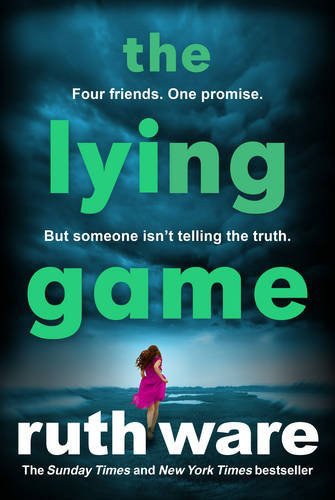 Written by Ruth Ware — There’s so much great crime writing out there these days that you can’t read everything, can you? That’s why The Girl on the Train is still on my to be read list, alongside The Woman in Cabin 10, which was one of the most talked-about novels of last year. Time to catch up with Ruth Ware, then and see what all the fuss is about.
Written by Ruth Ware — There’s so much great crime writing out there these days that you can’t read everything, can you? That’s why The Girl on the Train is still on my to be read list, alongside The Woman in Cabin 10, which was one of the most talked-about novels of last year. Time to catch up with Ruth Ware, then and see what all the fuss is about.
If Cabin 10 channeled Ware’s inner Agatha Christie, this time she’s taken Enid Blyton’s Mallory Towers books for inspiration, though don’t expect much in the way of midnight feasts, prep or lacrosse here. Two new girls sent to board at Salten School on the Sussex coast meet a couple of older pupils on the train… and their lives are changed irreparably.
Newbies Isa and Fatima have never gone to boarding school before, so being taken under the wings of Kate and Thea seems like a great way to settle in. Seventeen years later, Isa is the doting mother to baby Freya but she drops everything upon receiving a frantic text message from Kate. Soon they are all together again at Kate’s ramshackle home a couple of miles away from the school where they first met.
You see, back in those days the girls loved to indulge in something they called The Lying Game. The idea was to come up with plausible lies, with points awarded if the victim fell for it. The game bonded Isa, Fatima, Kate an Freya together and set them apart from everyone else. The four rebels also relished spending long, leisurely weekends with Kate and her father at the Tide Mill, a run-down old place on the edge of the Reach, which nowadays comes close to flooding at high tide and is where Kate still lives, the lone custodian to the memory of her dear departed artist father. It’s a place that meant everything to the foursome and was the venue for a moment which would change their lives forever afterwards.
Now Kate, Fatima and Thea are back, summoned by their friend Isa. It appears that, finally, what happened at Tide Mill all those years ago is about to be discovered. A human bone has been found in the Reach. How much of the truth are the friends prepared to reveal? When you’re as practised at lying as these four it is difficult to tell the wheat from the chaff.
All four women have moved on from that fateful day 17 years ago, but still it pulls them back in myriad ways. At the heart of it all is Isa, who is on maternity leave from her job at the Home Office. She is happy in her motherhood and has the love and support of a wonderful partner – but how long can happiness last if it is built upon the shifting sands of lies? Fatima is a doctor, married to a doctor and with two children. She’s recently returned to her Muslim faith – but can that be reconciled to the sins of the past? Thea was always the daredevil of the group, but she is now borderline alcoholic, surviving on drink, cigarettes and her nerves, while Kate lives a near-reclusive life in the property left to her when her father died.
Truth, lies, family ties, actions and consequences all play a huge part in this psychological thriller which I demolished in a day. It takes a good long while before we find out exactly what did happen all those years ago, and in the meantime Ware puts us through the mill, alongside her characters. They’re so well portrayed that I really felt I knew them, their raw emotions cutting me to the quick. Try to set aside a good length of reading time for this one because you won’t want to put it down.
For another great read that digs up the secrets of the past try The Search by Howard Linskey, or for more tricky female protagonists how about 13 Minutes by Sarah Pinborough? The Lying Game is out 15 June.
Harvill Secker
Print/Kindle/iBook
£7.99
CFL Rating: 5 Stars












I don’t know if I should give this book a chance. Although The Woman in Cabin 10 was a fast-faced thriller with some twists at the end, it didn’t come together for me logically. Twists are a staple of mysteries, but these didn’t make logical sense to me. I went back over the story and couldn’t find a way for the story to have happened as is revealed at the end.
Even with the Great Detective Sherlock Holmes, a reader could see his evidence and the clues left in his investigation. It all made sense in the end.
And in A Dark, Dark Wood just wasn’t a good book to me. It felt rather thrown together quickly. No real character development.
So, should I give another chance to this writer? I may.